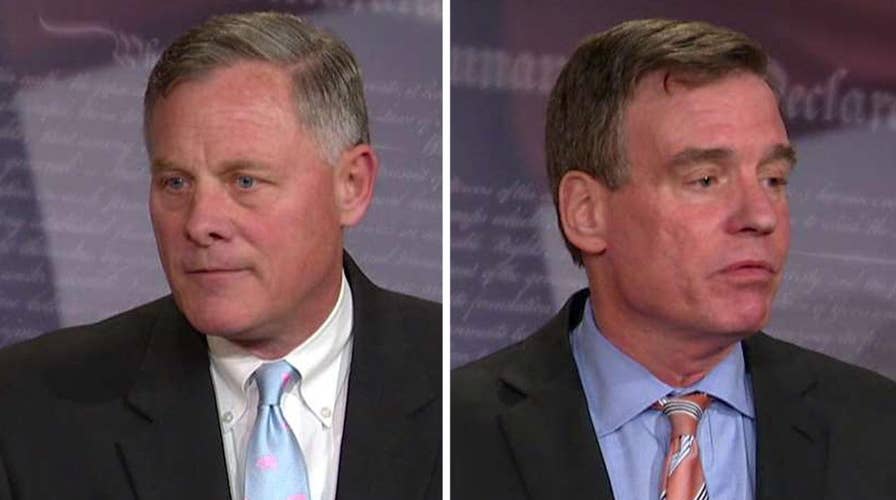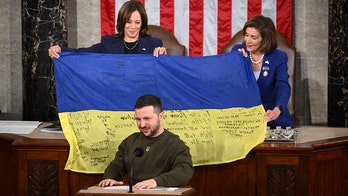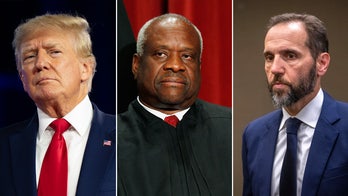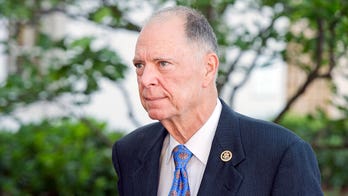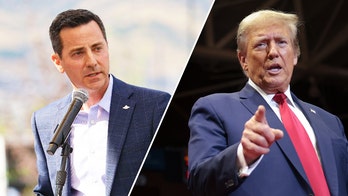Senators stress bipartisanship key to Russia probe
Insight from Kimberly Atkins, chief Washington correspondent and columnist for the Boston Herald
Leaders of the Senate Intelligence Committee announced Wednesday they are expanding their investigation of Russia’s interference in the U.S. presidential campaign and beyond, vowing to remain independent and “get to the bottom of this” – amid mounting controversy over a similar probe on the House side.
The senators announced they are now scheduling interviews and reviewing thousands of sensitive documents, and are prepared to issue subpoenas if necessary.
“This investigation’s scope will go wherever the intelligence leads it,” Chairman Richard Burr, R-N.C., told reporters, speaking alongside top panel Democrat Sen. Mark Warner, D-Va.
The committee is set to hold its first public hearing on the Russia issue on Thursday, a session that will feature several foreign policy experts. But on the sidelines, Burr and Warner revealed new details about the scope of their investigation.
Burr said they’ve devoted seven professional staff members to the investigation, and they’re going through “an unprecedented amount of documents.” He said they’re reviewing “thousands” of raw intelligence and other products.
Further, he said the committee this week began to schedule its first interviews -- making 20 requests so far, with five already scheduled. He confirmed that Jared Kushner, President Trump’s son-in-law and a senior adviser, is among those the committee will interview.
“We will get to the bottom of this,” Warner said.
Their joint press conference marked a stark contrast with how a similar investigation is proceeding on the House side, where top lawmakers are battling over whether a key Republican should even be involved.
That Republican, House Intelligence Committee Chairman Devin Nunes, R-Calif., riled Democrats last week after claiming he learned Trump transition team communications were incidentally collected during surveillance operations conducted under the prior administration. The comments clashed with FBI Director James Comey’s testimony to the same committee that they had no evidence to support Trump’s controversial allegations of wiretapping against him.
But Democrats voiced concern that Nunes was too closely tied to Trump. And top committee Democrat Adam Schiff, D-Calif., and others are now calling on Nunes to recuse himself from the Russia probe after it emerged he viewed secret information on White House grounds.
Nunes has rejected those calls, and defended his actions.
On Wednesday, Burr was asked whether he can pledge impartiality given his history as a Trump campaign adviser.
The senator said he “absolutely” could. He disclosed that he voted for Trump but suggested that would not affect the investigation.
He acknowledged a big “challenge” for the committee is now looking at whether Trump was involved in Russia’s meddling.
While Trump associates are under scrutiny for past contacts with Russia officials, the White House and its allies insist that Obama officials improperly snooped on Trump associates leading up to the inauguration.
Circa reported Wednesday that some intercepted communications in that period involved Trump transition officials or foreign figures’ perceptions of the incoming administration.
According to the report, top Obama aides routinely reviewed intelligence reports from incidental intercepts of Americans abroad, after rules were relaxed starting in 2011 pertaining to such surveillance. Such reports identified Americans either talking to foreign sources or discussed by foreign figures, according to Circa. Some names were “unmasked,” which is an issue certain Republican lawmakers are now looking at as they probe whether Trump associates were “unmasked” during the transition.
